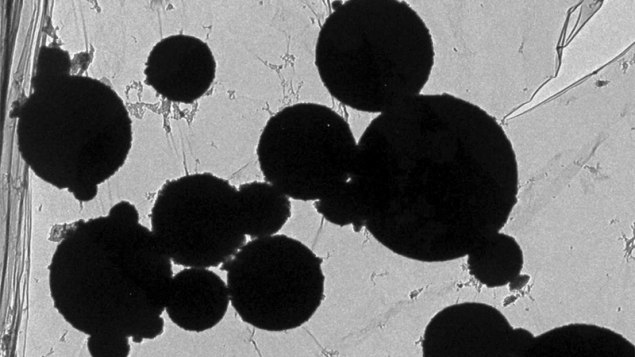The contaminated exhaust air infests the human brain with magnetic particles
 Bashny.Net
Bashny.Net
Scientists from Lancaster University has revealed is not the most pleasant fact: tiny particles from the exhaust gases that are inhaled by people, most likely, you'll go straight to the brain. And then they can contribute to Alzheimer's disease, scientists say.
It was already known that nanoparticles of iron present in the human brain. But it was assumed that these particles are iron, which is naturally found in the human body. It was believed that the source element is food, but not the exhaust gases.

However, after careful consideration of the structure of the particles, the researchers suggested that their source may be air pollution, for example exhaust gases. Iron, recall, is present in the bodies of people in various forms and is part of many biological molecules. Usually it is not harmful. Meanwhile, the form of iron, known as magnetite or iron oxide, is highly reactive and magnetic. And it is the presence of this form in the body is assumed to be associated with the development of Alzheimer's disease.
A research team led by Barbara Maher (Maher Barbara) of Lancaster University have studied the brains of 37 deaths of people who lived either in Manchester in the UK, or in Mexico city, capital of Mexico. It is noted that the age of the people was from three to 92 years.
Scientists discovered in the brain tissues of a large number of magnetite nanoparticles. The researchers say that magnetite is a toxic substance, it is also involved in the production of reactive oxygen species (free radicals) in the human brain, which in turn, according to the researchers, associated with neurodegenerative diseases, including Alzheimer's disease.
The experts used in their work, the spectroscopic analysis for more precise identification of the magnetite particles. In contrast to the angular (tetrahedral or octahedral) magnetite particles, which are assumed to have formed naturally in the brain, most of the observed particles was spherical.

Their diameter reached 150 nanometers, and some of them had a surface that resembled melted – all the features of high temperature forming, for example, the combustion of fuel.
"The particles we found were strikingly similar to nanochastitsami of magnetite, which are present in large numbers in polluted air, especially near busy roads," says Maher. Such particles produced by burning various types of fuel and friction heating of the motors or brake discs of the vehicles.
According to her, the shape of the observed particles is strong evidence that they originate from contaminated air. These nanoparticles are extraordinarily small, so probably can easily penetrate from the air into the nerve endings in the nose of the person, and then move from there to the brain, says the researcher.
The researchers also found that the brain contained metal nanoparticles, which are present in the engines of cars, but rarely found in the human body. Talking about platinum, Nickel and cobalt. "Because you know that the magnetite is quite a toxic substance for the brain, the results are forced to take another look at the air we breathe," says Maher.
According to Jo Anne Shatkin (Jo Anne Shatkin) from company Vireo Advisors, the results of the study are cause for concern. "The findings were not a surprise, since we knew for a long time we were faced with these nanoparticles. Now we just got a good opportunity to review them," she says.
"Our results show that magnetite nanoparticles can get into the human brain and, consequently, harm human health, including as a condition for the development of Alzheimer's disease," adds Maher.
The researcher has already made some adjustments to your lifestyle to avoid inhaling too much of nanoparticles.
"The findings are sufficiently alarming for me, so I changed my behavior. For example, if I have to go on a busy street, I try to go as far as possible from the road," she says. Maher now also avoids to climb the slopes next to the roadway because "cars when driving uphill generate more particles." The scientist concludes that every person should know about such things to protect themselves.published
P. S. And remember, only by changing their consumption — together we change the world! ©
Source: news-hl-cm.newsrep.net/h5/nrshare.html?r=3&lan=ru_RU&pid=14&id=pR2cd0bfcSZ_ru&detail=1&ch=200014&app_lan&mcc=260&referrer=200620&showall=1
It was already known that nanoparticles of iron present in the human brain. But it was assumed that these particles are iron, which is naturally found in the human body. It was believed that the source element is food, but not the exhaust gases.

However, after careful consideration of the structure of the particles, the researchers suggested that their source may be air pollution, for example exhaust gases. Iron, recall, is present in the bodies of people in various forms and is part of many biological molecules. Usually it is not harmful. Meanwhile, the form of iron, known as magnetite or iron oxide, is highly reactive and magnetic. And it is the presence of this form in the body is assumed to be associated with the development of Alzheimer's disease.
A research team led by Barbara Maher (Maher Barbara) of Lancaster University have studied the brains of 37 deaths of people who lived either in Manchester in the UK, or in Mexico city, capital of Mexico. It is noted that the age of the people was from three to 92 years.
Scientists discovered in the brain tissues of a large number of magnetite nanoparticles. The researchers say that magnetite is a toxic substance, it is also involved in the production of reactive oxygen species (free radicals) in the human brain, which in turn, according to the researchers, associated with neurodegenerative diseases, including Alzheimer's disease.
The experts used in their work, the spectroscopic analysis for more precise identification of the magnetite particles. In contrast to the angular (tetrahedral or octahedral) magnetite particles, which are assumed to have formed naturally in the brain, most of the observed particles was spherical.

Their diameter reached 150 nanometers, and some of them had a surface that resembled melted – all the features of high temperature forming, for example, the combustion of fuel.
"The particles we found were strikingly similar to nanochastitsami of magnetite, which are present in large numbers in polluted air, especially near busy roads," says Maher. Such particles produced by burning various types of fuel and friction heating of the motors or brake discs of the vehicles.
According to her, the shape of the observed particles is strong evidence that they originate from contaminated air. These nanoparticles are extraordinarily small, so probably can easily penetrate from the air into the nerve endings in the nose of the person, and then move from there to the brain, says the researcher.
The researchers also found that the brain contained metal nanoparticles, which are present in the engines of cars, but rarely found in the human body. Talking about platinum, Nickel and cobalt. "Because you know that the magnetite is quite a toxic substance for the brain, the results are forced to take another look at the air we breathe," says Maher.
According to Jo Anne Shatkin (Jo Anne Shatkin) from company Vireo Advisors, the results of the study are cause for concern. "The findings were not a surprise, since we knew for a long time we were faced with these nanoparticles. Now we just got a good opportunity to review them," she says.
"Our results show that magnetite nanoparticles can get into the human brain and, consequently, harm human health, including as a condition for the development of Alzheimer's disease," adds Maher.
The researcher has already made some adjustments to your lifestyle to avoid inhaling too much of nanoparticles.
"The findings are sufficiently alarming for me, so I changed my behavior. For example, if I have to go on a busy street, I try to go as far as possible from the road," she says. Maher now also avoids to climb the slopes next to the roadway because "cars when driving uphill generate more particles." The scientist concludes that every person should know about such things to protect themselves.published
P. S. And remember, only by changing their consumption — together we change the world! ©
Source: news-hl-cm.newsrep.net/h5/nrshare.html?r=3&lan=ru_RU&pid=14&id=pR2cd0bfcSZ_ru&detail=1&ch=200014&app_lan&mcc=260&referrer=200620&showall=1
Tags
See also
Epic blockage of the brain: How destructive people skillfully shift the responsibility on you
Epic blockage of the brain
Neural mechanism of formation of internal resource
Brain tricks
20 shocking facts about fast food that will forever change your attitude towards them
Technical and scientific myths. Why planes fly
The effect of the carpenter: muscle memory exists
In less than 100 years: the return of the theory of the unconscious Sigmund Freud
Changes to the people in the future
Cymatics: the Memory of water and the power of sound

















